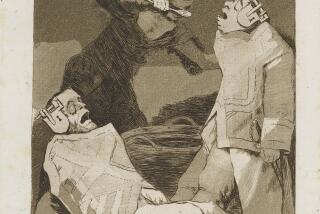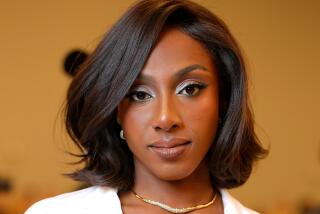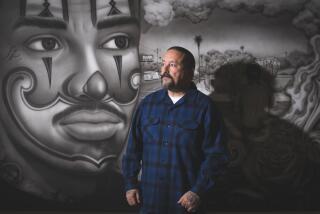S. African cartoonist under attack
- Share via
JOHANNESBURG, SOUTH AFRICA — Zapiro, as one of South Africa’s most controversial cartoonists calls himself, is a liberal pro-Palestinian Jew who was detained under apartheid for drawing the security police of the minority white regime as gun-toting pigs. Now he’s under attack by the ruling African National Congress over a cartoon critical of party President Jacob Zuma.
The cartoon shows Zuma preparing to rape the justice system, portrayed as a blindfolded woman pinned down by his political allies in the ANC, the Communist Party, unions and the ANC Youth League.
Published in the Sunday Times of Johannesburg, the cartoon lampoons a campaign by Zuma’s supporters to throw out charges of corruption, fraud and racketeering that he faces so he can seek South Africa’s presidency. In a country with one of the world’s highest rates of rape -- and one deeply divided between supporters and opponents of Zuma, who was acquitted of rape charges in 2006 -- the drawing has been explosive.
The nation’s high court is due to rule today on Zuma’s bid to have the charges against him dismissed.
Zapiro, whose given name is Jonathan Shapiro, knew that allies from his days as an anti-apartheid activist would be furious about the drawing. He was right. In a statement Monday, the ANC, its youth league and the Communist Party said it was “disgusting.”
As he has done since the 2006 rape trial, Zapiro drew Zuma as having a shower sprouting from his head -- a reference to the party leader’s testimony that to avoid AIDS he showered after having unprotected sex with an HIV-positive woman. Zuma has thrice sued the cartoonist for libel. Two suits were withdrawn; the third is pending.
The cartoon, along with Zapiro’s other work, can be seen on his website, www.zapiro.com. Zapiro spoke with the Los Angeles Times by phone Thursday from Cape Town. “I can sit and talk to you while I draw,” he said.
What’s the central message of the cartoon?
The central message is that Jacob Zuma is about to violate and rape the justice system with the help of his political allies. Justice is an allegorical figure but she does have a certain amount of humanity in the way I’ve drawn her, which added to the shock value. It’s [Zuma’s] own rape trial, for which he was acquitted, that makes it more explosive.
Did you hesitate before publishing the cartoon?
Yes, but that’s not what nearly stopped me from doing the drawing. If I were doing the cartoon in another country about someone who’s trying to become president and in the process he’s trying to wipe away 4 million rand [almost $500,000] worth of corruption charges stretched over a decade so that he can become president with a supposedly clean slate -- that would set someone up anywhere in the world for heavy criticism.
It wasn’t my being worried about Zuma’s rape trial that made me think twice, three times, four times, five times before doing this drawing. It was women’s feelings I was more worried about. I sent the cartoon around to some very trusted female friends. The initial shock at seeing the drawing almost made people draw breath. You gasp when you see it. But within a brief amount of time they considered the drawing and said it’s valid both in terms of what it’s saying about Zuma’s violation of our justice system and our constitutional tenets but also in terms of the very violent and patriarchal society that we have.
So people were not shocked by the cartoon [given its violent image and the racial sensitivities in South Africa]?
There were plenty of people who were offended by it, but what I found fascinating is that on some of the talk shows where I have taken some flak, the proportion of flak-givers is much higher from men than women. There was one call that came from a gang-rape victim, who said that she was shocked by it and felt very uncomfortable, but then she proceeded to support it.
Two other rape survivors phoned in and said very similar things, all positive. I think men are getting huffed and puffed by it. They’re the ones who are feeling uncomfortable.
Another big issue that has cropped up is racism. I am close to [Sunday Times Editor] Mondli Makhanya. He had no hesitation in publishing it. There are many other black editors, opinion makers and columnists who are essentially behind what I have done here. But there are some who have accused me flat-out of racism, which I reject. I do have a long history of involvement in the [anti-apartheid] struggle.
The thing is I feel that it’s the current crop of ANC leaders who are violating the spirit of the struggle.
How do you see the role of a political cartoonist in South Africa?
I see the role of a cartoonist here to be the same role as a cartoonist wherever there’s freedom of expression and that is to really knock people off their pedestals if they look as if they need knocking off. It’s also to maintain a watchdog role when it comes to democracy and justice. It’s also to be rude and offensive and to make new connections and start debates and to be hard to deal with.
What are you drawing now?
I’m drawing a direct follow-up cartoon. I’ve got the same scenario. They’re all looking a lot more pious. Zuma is just gesturing at her. She looks very angry even though she’s got a blindfold. I think I’ve succeeded. He’s just saying, “But before we start, I just want to say how much I respect you.”
--
More to Read
Sign up for Essential California
The most important California stories and recommendations in your inbox every morning.
You may occasionally receive promotional content from the Los Angeles Times.










